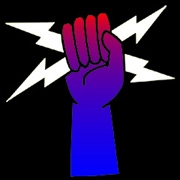- View the original movie site
- View the hacked site by clicking on the word, "Hacked version" on the left.
|
|

|
The two images shown here are the pre- and post-hacked versions of the promotional page for a movie titled "Hackers".
Think it's ironic that this site got hit?? Many people on the Web didn't, in fact some accused the movie studio of "hacking themselves" as a publicity
stunt. Others thought the page was intentionally left insecure in the hopes that someone would hack them.
The studio replaced the original site, but maintained a link to the hacked site, as well as to a letter and photograph
(with faces obscured) of the group that the studio says claimed credit for the hacked version.
|
|

|

|
 The Nation of Islam page got hit by hackers a few days after the Million Man March in October, 1995. The page was marred by racial slurs and attacks, but was quickly taken down. Both the hacked page and the original, official version are not available on the Web at this time, although you can read about the hacked page and visit the restored Nation of Islam site . A portion of the hacked page has been archived, however, for those interested in getting a glimpse of how the page appeared. |
More Hacked Pages
|

A few useful/interesting sites maintained by or explaining hackers: Formula for cracking a password Contest to "Crack a Mac", encouraging people to hack O/S 8 for the Macintosh. |
Some people engaged in hacking are careful to differentiate themselves from someone who maliciously destroys or alters a page. In their eyes, hackers are skilled users of multiple programming languages who hack in an attempt to increase their knowledge and for the challenge it presents. For more on what defines a hacker and what does not, click on the highlighted text.
The single biggest reason hackers use to support their actions is also a very compelling one--freedom on the Internet. By hacking, many people believe they are able to exercise their First Amendment rights to free speech to their fullest extent. One place to learn more about this issue is the Electronic Freedom Frontier's "Hacker" Archive. While this archive is far from a complete resource, it has a number of thought-provoking pieces, many of which condone hacking.
Hacker AwarenessThe computer industry press is beginning to cover hacking and its effects seriously. Below are links to three of the more recent articles that have appeared, both in magazines with online and print versions.
"Is Your Web Site as Secure as You Think?"
"Hacking the Web--A Security Guide" |

|

|
This site was created especially for students of the UNC School of Journalism's JOMC 050 Class, and anyone else who may be interested. For more information, please contactdaikat@email.unc.edu |